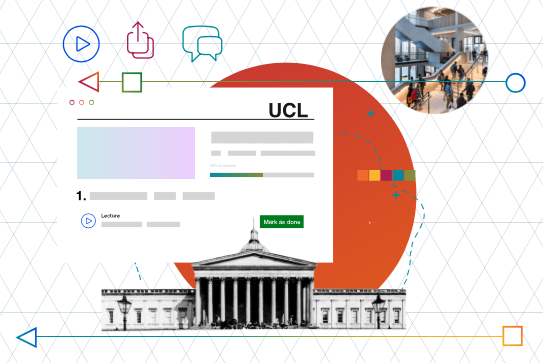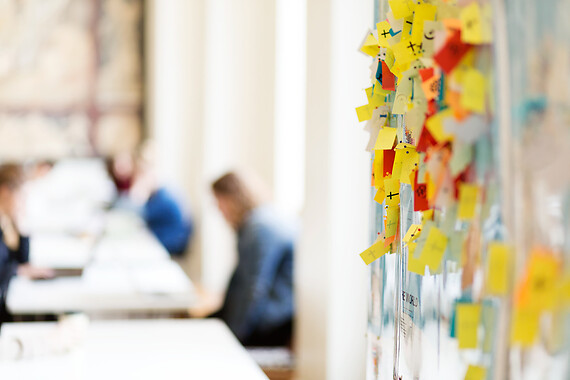Projects
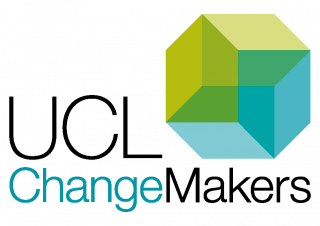
Page contents
The following topics are covered on this page:
- What are ChangeMakers Projects
- Inclusive Partnerships
- Who can apply?
- How does it work?
- Support for developing your application
- Further support and guidance
What are ChangeMakers Projects?
UCL ChangeMakers has been running at UCL since 2014/15. It was initially set up to support student's ideas to enhance education at UCL. This has evolved to a student-staff partnership approach where students and staff collaborate as equal partners on projects that improve the learning and wider student experience at UCL. This offers an expansive approach to educational enhancement, by recognising that students and staff have something different but valuable to offer. ChangeMakers provides funding for student stipends and project expenses to facilitate this process, as well as a wealth of experience and support to help make the project a success. This makes ChangeMakers a great initiative for taking action on student ideas and feedback.
The staff-student partnership has been fundamental to this project and has been the foundation of all planning, design and co-ordination. Staff and students alike committed considerable time to this project, from the initial proposal through to our collective evaluation and reflections. UCL Staff Partner
Inclusive partnerships
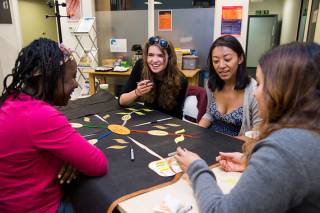
“The collaboration has fostered an exchange of knowledge that was fundamental to the functioning of this team and the establishment of this project. It brought diverse perspectives and expertise to the project, leading to more comprehensive and insightful outcomes. UCL Staff Partner, 2022/23““
Student-staff partnerships offer an opportunity for students to influence education, engaging them as actors rather than objects in learning or research. They enable us to acknowledge the complex identities and experiences individuals bring to learning and knowledge co-construction (Mercer-Mapstone and Bovill, 2020). Being intentional about how we are working and who we are working with will help to ensure we are empowering under-represented and marginalised students, rather than replicating existing inequalities and prioritising the voices of the already engaged.
- Use the 'Creating Inclusive Partnerships' toolkit to build an inclusive and culturally sensitive partnership approach to your ChangeMakers project.
Who can apply?
- Anyone can apply for project funding.
- We particularly welcome applications from staff and students who are underrepresented and/or identify as belonging to a marginalised group.
- Applications must be a joint made between staff and students to signal a partnership approach from the outset.
- We also prioritise projects that are looking to make change across a programme or department(s), rather than making a change on an individual module. However, we do recognise that some projects will want to pilot the change on a smaller-scale initially, but these will be looking at how changes or lessons learnt can be shared and implemented more widely.
I'm a student, and not sure who to work with in my department:
The ChangeMakers team are here to support you in developing an initial idea and identifying who to approach in your department to get your idea up and running. Reach out to Fiona Wilkie for an initial chat (f.wilkie@ucl.ac.uk) or consider attending one of our support sessions like: 'Stepping into Partnership'.
“What was surprising was the level of interaction with the staff – personal meetings, conversations etc. were all common and very relaxed. There was never a feeling of intimidation or authority that made the work uncomfortable. UCL Student Project lead, 22/23
How does it work?
1. Pick a theme:
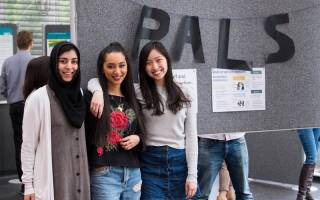
Enhancement theme: Making Connections
This is a broad theme to encourage teams to explore educational enhancement in terms of the different ways students want to make connections during their university experience. This could be:
- Connections between people: with staff, their cohorts and between year groups and levels of study;
- Making connections between what students are learning and the cutting-edge research our staff are engaged in;
- Connecting course learning with the bigger societal challenges and students' own aspirations to make an impact on the world;
- Connections with industry and how students develop their professional skills;
- Ensuring students feel well connected at university so that they are able to succeed and thrive whilst here.
This theme recognises that making connections at university is vital to a good student experience, helping students develop a sense of belonging and disciplinary identity.
Find out more about this theme, including examples of past projects
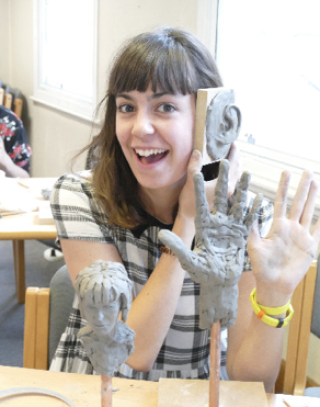
Innovation theme: Re-imagining Education
This theme supports projects that are keen to explore how we can do things differently at UCL. UCL's Education Priorities and Project paper sets out a vision for a futures-orientated approach to education
- These projects can be used to test out an idea before it is embedded in the curriculum.
- It might also be that you don't have the solution right now, but the project will help facilitate a process of 'unlearning' or 're-imagining' with students and staff to help consider new possibilities.
- For this theme, your application might set out the challenges and how you will plan to facilitate co-creation and collaboration between staff and students.
- We are particularly keen to hear from teams wanting to work across programmes, departments or centres to see how cross-disciplinary collaborations can fuel changes in education.
This theme also represents a really good opportunity to think through concepts like social justice and equity in education or to explore how developments in AI could assist student learning.
Find out more about this theme, including examples of past projects
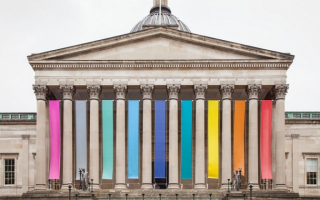
Eugenics Legacy Education Project (ELEP) theme: Engaging with Difficult Knowledge
This theme offers support and funding for students and staff to come forward with ideas such as updating module content, modelling good practice, and working creatively with difficult knowledge. One the key aims of the project is to work with students, especially people who experience structural discrimination and exclusion that stems from eugenic ideas.
- Find out about the Eugenics Legacy Education Project
- Get more information and support for a developing a project under this theme
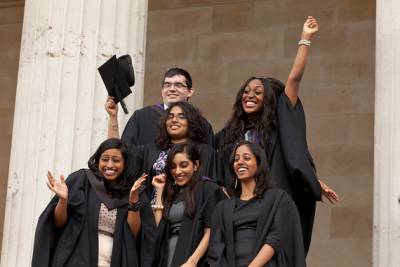
Student Success ChangeMakers fund
The UCL Student Success team and ChangeMakers are excited to present a transformative initiative dedicated to empowering marginalised and underrepresented students. The UCL Student Success team leads on the design, development, and implementation of UCL’s strategies to support academic success and close awarding and retention gaps across UCL and one factor in achieving these aims is the pressing need for inclusive educational opportunities.
This funding allocation of up to £5000 is intended for students who self-identify as members of marginalised or underrepresented groups within the UCL community, to enable the academic success, retention and continuation of underrepresented, UK domiciled, undergraduate students.
The approach centres on the unique strengths, resilience, and untapped potential within marginalised communities. Through this initiative, we aim to proactively address systemic barriers, and provide these student groups with the platform to contribute to real change at UCL.
- Get more information and support for developing a project under this theme
- Find out more about the Student Success team
2. Choose your project hours:
You can bid for funding for either a 60-hour project or a 90-hour project. Project hours can be divided between multiple students as fits your project's needs.
60-hour projects: £900 available to pay student stipends
This amount of project hours is good for a small team of students working with a member of staff to pilot and evaluate a change.
90-hour projects: £1300 available to pay student stipends
This amount of hours might particularly suit cross-disciplinary or faculty-level projects where you need a bigger team of students.
3. Identify project Expenses:
In addition, the team can also bid for up to £300 in project expenses to pay for things like vouchers for incentives and catering for events/sessions/workshops. Project expenses cannot pay for capital costs e.g. equipment.
4. Make an application via our UCL ChangeMakers Moodle.
- to work on with your project team. Info can then easily be copied and pasted into our online form via the ChangeMakers Moodle.
- The application form has been designed to help you think through the various stages and considerations for your project, so will help you plan out a successful and manageable project.
- Make sure you have looked at our project funding criteria.
Support for developing your application:
- Book onto a ChangeMakers Initial Guidance session to get an overview of what ChangeMakers is, how it works and tips for putting in a successful application. This session is open to all staff and students at UCL.
- Come long to our 'Designing a ChangeMakers Project' workshop where we can support you in developing a partnership approach that will work for your students. This session works best when staff and students from the team join together.
- Are you a student and not 100% sure if this is for you? Our 'Stepping into Partnership' session is a student-only session and will cover some areas like: making change, building networks and developing your idea.
- Familiarise yourself with our project criteria (via our Moodle), which our student/staff panel will use to review applications against and award funding.
 Close
Close


